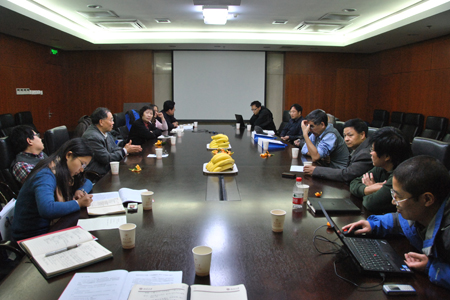News & Events | About PKU News | Contact | Site Search
Peking University, Dec. 4, 2012: To share and summarize the experience on small-class teaching try-out for the undergraduate courses of the fall semester was held on November 23. Positive feedbacks from professors and students involved in the program made the school leaders determined to keep the momentum going.
PKU Vice President Wang Enge, PKU President Assistant Li Xiaoming and other school leaders attended the seminar, with faculties involved in the small-class teaching program, experts from a strategic group and a research group of elder professors. PKU Provost Fang Xingui hosted the seminar.
Teacher representatives and student representatives shared their experience and afterthoughts of small-class teaching. Professor Cheng Tansheng from School of Physics gave a report on the pilot course Quantum Mechanics in which he concluded that small-class teaching played an important role in development of creativity and stimulation of learning initiative of the students. Professor Yang Jiazhong from School of Mathematical Science, Professor Zhu Shilin from School of Physics, Professor Wang Yingxia from College of Chemistry and Molecular Engineering, Associate Research Fellow Fu Xinmiao from School of Life Sciences and Professor Chen Zhong from School of Electronics Engineering and Computer Science also reflected on their teaching experiences with small classes, all concurring that the positive effects of small-class teaching were indeed emerging.
Student representatives Li Yuanhe and Deng Zhaoguo demonstrated that small-class teaching had crafted the students’ capabilities of retrieving information, expressing thoughts, summarizing, innovating, communicating and collaborating, based on their real-life experiences plus surveys and interviews. Despite some pressure felt in a smaller group in a class, they believed they did learn more.
Professor Yu Daoheng, leader of the research group of elder professors, acknowledged the initial achievements of small-class teaching and pointed out that further exploration were needed. Wang Qiong, Dean of Center for Educational Technology, gave an introduction on how to improve small-class teaching with the help of educational IT services provided by the center.
PKU Vice President Wang Enge addressed that small-class teaching was a new teaching method put forward to meet the needs of high-quality teaching and talents cultivation, based on thorough investigations and surveys. It focused on promoting “five changes”, namely changing the traditional teaching methods to encourage more interaction during class and speaking in public, changing the out-dated teaching contents to encourage a more challenging and flexible syllabus, changing the professor-oriented Q&A channel to encourage self-motivated learning and better communication skills, changing the monotonous evaluation method of mid-term and final exams to encourage consistent learning habit and all-around evaluation and finally changing the separation between teaching and learning to encourage life-time friendship between professors and students. Wang Enge stressed that as a reform method of teaching, small-class teaching should be tailored to each discipline and even each course when being carried out, which would be fully supported by the school.
On the afternoon, the attendees discussed how to strengthen and improve small-class teaching in five different groups divided by discipline, covering such topics as sustainable development of the new teaching method, ways to encourage students to discuss and how to increase interaction between teachers and students.

Extended Reading
To echo the call of Ministry of Education, China to improve the quality of teaching, PKU launched the pilot program of small-class teaching in the fall semester in 2012. It is an important teaching method which has been widely adopted by world-class universities and has seen remarkable effects in stimulating students’ initiative and potential in learning, activating interactions between teachers and students, improving teaching quality and cultivating innovative talents.
PKU has attached great importance to the pilot program of small-class teaching. PKU Council Chairman Zhu Shanlu and PKU President Zhou Qifeng have repeatedly pointed out the important role of small-class teaching in educational reform, which should be regarded as the primary work in the undergraduate education. PKU Vice President Wang Enge also makes it clear that small-class teaching can serve as a wind vane, aimed to urge all the teachers make more effort to value teaching, care the students and cultivate talents.
Several schools of PKU are actively involved. School of Mathematical Science, School of Physics, College of Chemistry and Molecular Engineering, School of Life Sciences and School of Electronics Engineering and Computer Science started the small-class teaching pilot program on 6 compulsory basic courses, with 8 big classes and 46 tentative small classes established and over 60 famous professors and scholars being chief course instructors or faculty advisors.
Written by: Gao Hongfei
Edited by: Chen Long
Source: PKU News (Chinese)